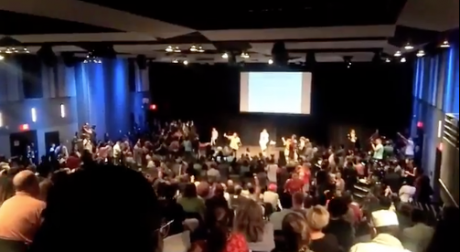Columns
You are here
The community has its say

July 23, 2016
The United Steelworkers along with many other unions organizes a float in the Pride Parade in Toronto. Labour has had a major role in the fight for LGBTQ rights in Canada and Quebec including anti-harassment language, anti-discrimination language, and same-sex benefits negotiated in collective agreements long before similar protections were legislated. This was of course due to the pressure of activists. The role of working class organizations in the ongoing fight for our rights is very important today as we strategize for change.
Pride is political
This year labour was at the very end of the staging area and we were baffled by the long delay in moving forward. We later learned that Black Lives Matter, which was near the front of the march as an honoured guest, staged a sit down. It stated that the police should no longer be allowed to march in the parade, that more funding be given to Black Queer Youth, that more Black performance space be available, and that there be more inclusivity for other marginalized groups. This action harkened back to Stonewall, and the street actions of the early gay liberation movement.
There was a lot of criticism of BLM in the media. A city councillor threatened to bring forward a motion demanding that the police must be allowed to participate, but after pressure this was withdrawn. Progressive organizations rallied in support of the young Black activists and the issues they were raising.
Community consultation
Later in that same week a consultation meeting was called, the first of a number planned by the government of Ontario on its new Anti-Racist Secretariat. In light of the police shootings, the controversy over carding and systemic anti-Black racism it was packed with an overflow crowd in the foyer, on the entrance steps and the sidewalks. Probably 800, people primarily from the Black community, had come out. Premier Katherine Wynn and Mayor John Tory along with other government representatives were there to address, and then hear from those gathered.
It was an angry, vocal crowd that had no hesitation calling out the racism they face every day in this city and this province. Akua Benjamin, who was active in the Black Action Defense Committee in the 1980s, was the first to speak and set a militant tone. Representatives from the National Council of Canadian Muslims, the Urban Alliance on Race Relations, the Asian Canadian Labour Alliance, the Chinese Canadian Nurses Association, the African Canadian Legal Clinic and unions such as the Canadian Union of Postal Workers Toronto Local, Unifor and the United Steelworkers Toronto Area Council all gave their support to Black Lives Matter.
The vast majority of speakers were from the Black community calling for action from every level of government. It was a momentous gathering with both tension and excitement in the air, and hopefully will set a tone for the future. The government called the meeting, but did not control it. Those present lined up patiently to have their say but the night was theirs, with plenty of shout outs from the audience. The Premier and the Mayor made short remarks at the start and then they were consigned to the corner of the stage listening to speaker after speaker. The meeting went way over time and in the end every speaker was allowed to the mike.
Desmond Cole, an activist and columnist with The Toronto Star, called on Mayor Tory to apologize for not meeting with Black Lives Matter when it occupied the front of police headquarters for weeks demanding that an inquiry be called after a police killing. Tory went to the mike and agreed that he should have met with the BLM organizers. He appeared extremely uncomfortable. Witnessing it, I felt he had no choice but to admit he was wrong due to the mood of the crowd and the strong support for BLM from the Black community and wider organizations that were there in solidarity. It was in many senses an historic meeting with tremendous unity from the floor. Everyone in that room was calling for change and made it clear that they were not going to accept government inaction. It is this type of grass roots activism that is critical to moving the struggle forward.
Section:
Topics:









